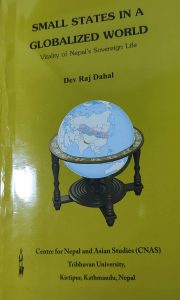Professor Dev Raj Dahal
Senior Political Scientist
Nepal

In his book, The Next Convergence, noted economist Michael Spence writes, “The Challenge for Small States” from globalization highlighting two specific problems: the undiversified economy is vulnerable to external shocks; and cost of governance becomes high owing to a small population (2011:120-21). For Nepal, the problem is both. Diversified international cooperation, not concentrated dependence for power and legitimacy in one country is, therefore,essential to overcome the cost of being a small state. The historical psychology of claustrophobia, the fear of closed spaces of land-locked geography, did not mean Nepal’s intellectual and moral retardation and domination of monistic doctrine and worldview. It can overcome this fear now by modern communication, air, road and rail connectivity with the neighbors and global powers and formulate endogenous development strategy based on its competitive forte.
]In this context, Nepali leaders, think tanks, intellectuals and citizens are imagining many possibilities for the nation unlocked by the connectivity projects of neighbors-India and China-and capture mutually beneficial arrangements so that vital gains from one side is not overturned by the other’s geostrategic maneuver like in the past.
For example,Nepal’s import-substituting and export-promoting industries created with the Chinese and the Soviet grant assistance had been privatized, denationalized and closed off to get rid of their influence in Nepal. National independence springs from a strategy to diversify dependence, keep oneself safe from the differences with other states, defy undue external pressure arising out of changing power equations and project enlightened national interest in world politics.
The role of national leaders and their policymakers in the future lies in using all historical and comparative insights at their disposal, glean strategic foresight of the latest interconnected geopolitical shift and find the solution of the impacts of globalization by reducing the costs of governance to the nation. A weak state is in no way capable of coordination of various forces compatible with national goals.
The financial costs of politics have soared for the poor Nepalis to subsidize the bloated size of politicians and bureaucrats who have shown imprecise interest in their representation, public policy making,problem mitigation and service delivery duties. The size of institutions has swollen while economic opportunities for youth within the nation are sliding downhill non-stop. Too much of Nepal’s money ends up in non-productive sectors, corruption, rent-seeking, foreign visits of leaders and civil servants, flight to foreign banks and financial flows transcending rules governing the national integrity system. The growing size of the debt burden of about $ 14,248 million in 2020,huge trade deficits of $11.37 billion in 2019 and swollen unsettled accounts of the government are obstacles to financial integrity,transparency and accountability. It is a burden on the future generations and a drain of scarce resources so vital for Nepal’s overall progress.
Similarly, political institutions that determine the performance of the economy have become less effective for reasons of recruiting party funders, affiliates, cadres and incompetent persons with no record of performance in administration, management, leadership and diplomatic deftness. They do not promise the creation of a fairer and reasonable society and improve the nation’s image abroad.
Following the proliferation of political parties, their frequent splits and added size of politicians, powerful interest groups, myriad of national commissions and federal units and increased cost of election campaign financing, economic burdens on ordinary Nepalis have become exorbitant. Business groups have increasingly become powerful to skew the law-making power of the parliament while the capacity of the government to utilize the development budget, loans and grants for the well being of ordinary citizens has drastically plummeted.
The national tax effort ratio is not enough to run a self-sufficient state.Its contribution to GDP is about 18 percent. About 60 percent of the national budget is spent on salary, pension and perks of government officials with little money left for development. Low taxation has a direct bearing on the quality, autonomy and accountability of governance.The economic foundation of the nation’s foreign policy cannot be robust if the productivity of agriculture and industries, specialization and innovation do not move up the ladder of sustainable development.
However,”sustainability alone is not enough, we need to be concerned with survivability” (Martin, 2007:6).

Thomas Picketty, another popular economist, has gone much deeper to unveil the problems of small states in the context of globalization.His article, “The Exorbitant Cost of Being a Small Country» published in Chronicles: On Our Troubled Times argues that in “the new world economy, the cost of being a small country is becoming exorbitant.”He adds,”We find ourselves accepting things that are more and more unacceptable and contradictory to our values” (2016:139-41).
The main traits of high-cost Nepali economy are:”‘geo-physical limitation and landlockedness, no direct access to the sea, poor transport facilities,high cost of doing business, relatively high tax burden and high rate of interests in lending” (Dahal, 2013: 21). The other equally vital elements are the use of de-contextualized social science in public policy, unproductive use of conditionalized aid, expansion of the patronage-based distribution of public goods and the crisis of national ideology of Nepal aggravating disquiet.
The adoption of the primacy of neo-liberal free market for almost three decades following post-1991 economic liberalization confiscated the authority of politics to shape public policies and emasculated the national strength to cope with the unfavorable strategies and tactics of comprador classes of the nation.Similarly, multinational competitors have blurred the boundaries between democratic politics, uncompetitive market and infirmity of purpose, uttering too many voices in international fora devoid of forward style of entrepreneurial and niche diplomacy.The public universities and think tanks of the nation are in a battered condition owing to over partisanization and shortage of competent personnel. Native intellectuals and leadership exhibit poor aptitude to invent and articulate policy-relevant and solution-oriented knowledge pertinent to address the nation’s multi-dimensional problems. The coyness of intellectuals before the political leaders and the absence of solidarity with the ordinary citizens illustrate an awful imbalance ofpower, knowledge and policy. It seems Nepali leadership has nothing to wrestle with except jockeying for power and exercising leverage even refusing to respect the system that checks the power of elected leaders.«If a nation is to prosper, it must always have something to fight for” (Kaplan, 2003;26), something that is public and national in purpose. It must grab national and global attention and conduct study for conceptual and substantive foreign policy inputs.In times of deep national crisis, Nepali citizens are rediscovering their metaphysical roots, value patterns of social and gender equality tolerance to diversity, nostalgia of historical dignity and rolling out creative ideals for a balanced foreign policy.

These are supportive of nation-building and good governance. The abdication of policy making prerogative by the Nepali parliament so far has allowed knowledge,policies, laws and institutional designs to flow to the nation largely fabricated from outside for different contexts, purposes and needs.The domination of parliament by powerful interest groups broke the historically evolved social solidarity and rendered the national social contract fragile, distorting national priorities and popular sovereignty embedded in the Nepali citizens and the state. As a result, non-sovereign entities such as the lobby, caucus, bichauliyas (middlemen), free-riders, consultants and externally-funded experts have become insider experts of policy making. They are not organic in thinking embedded in the life-world of people. They are more interested in patronage expansion through the distribution of public budgets in studies with no relevance to policy making, nation-building and democratic development.
They are defending direct foreign aid to local bodies aiming to weaken the authority and legitimacy of the heartland of Nepali state while elected MPs, National Planning Commission and people’s representatives have become outsiders.
This has undermined the democratic self-determination of internal politics and national aspiration to become a great stabilizer of regional geopolitics.
To be concluded: Ed. Upadhyaya.
# Our contact email address is: editor.telegraphnepal@gmail.com
